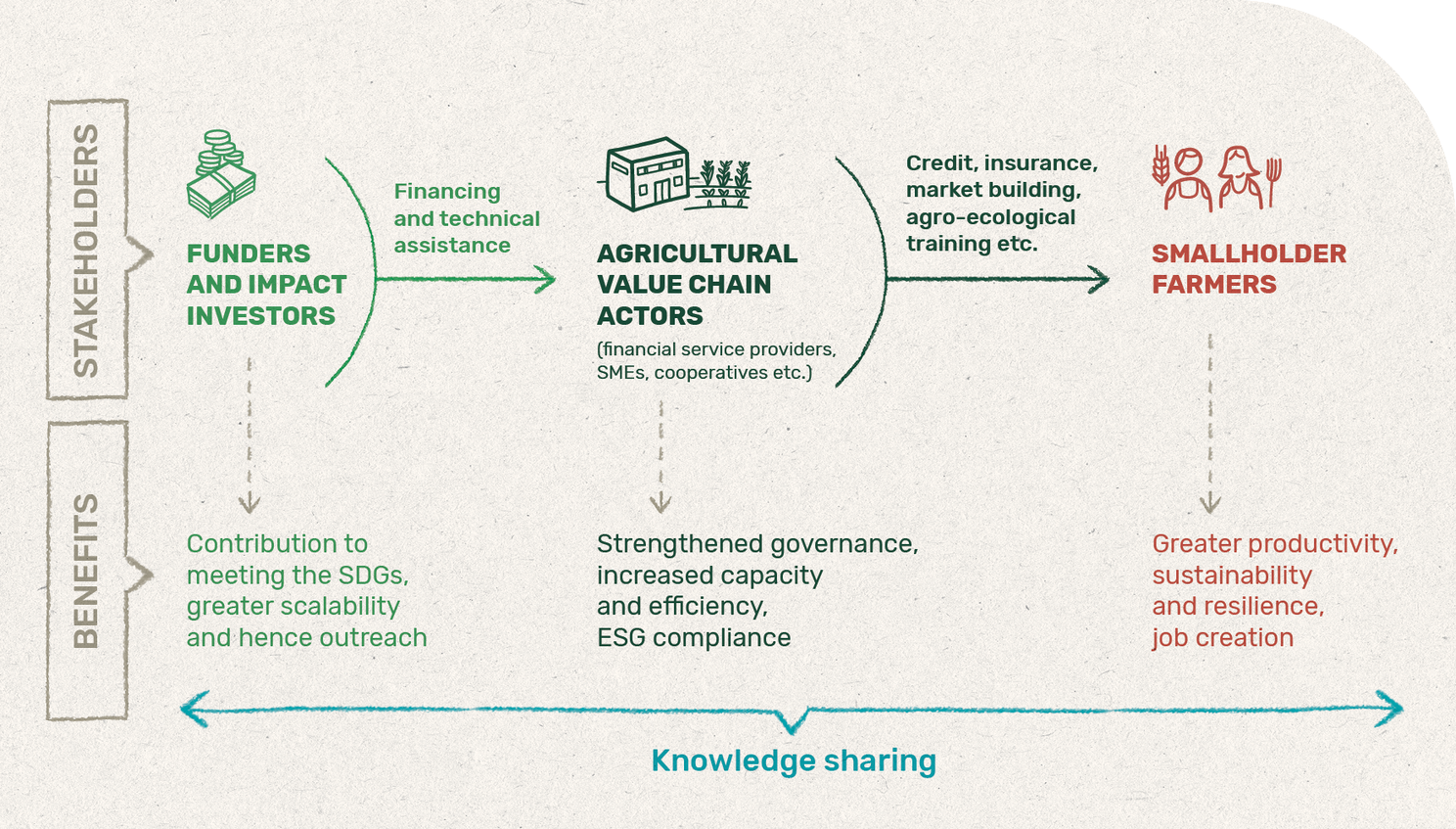
SSNUP aims at increasing the productivity and resilience of smallholder farmers in Africa, Latin America and Asia thanks to improved risk management and the promotion of sustainable, climate-smart farming practices. As a result, this programme will not only improve the food security and living standards of up to 10 million smallholder farmers’ households, but it will also contribute to the development of sustainable agricultural value chains.
The ten-year programme leverages the knowledge and expertise of multiple technical assistance facilities of impact investment funds to reach as many smallholder farmers with as little bureaucracy as possible. While SSNUP is supported by the governments of Luxembourg, Switzerland and Liechtenstein, ADA coordinates the programme and ensures knowledge sharing and the dissemination of best practices amongst the participating investors and their partners for the benefit of the agricultural sector as a whole.



SSNUP will result in greater resilience of smallholder farmers, stronger agricultural value chains and increased investments in the agricultural sectors of developing countries. The programme will bring many benefits which will not only have a positive impact on smallholder farmers but also on their households and communities:
- Enhanced productivity and hence more income for up to 10 million smallholder farmers thanks to more efficient production methods, an increased use of technology and easier access to financing and market information.
- Greater resilience of smallholder farmers and their households (up to 50 million people) thanks to improved agricultural risk management and/or insurance products which will make them less vulnerable to external shocks, such as extreme weather and price volatility.
- Environmental protection thanks to sustainable and climate-smart farming practices.
- Strengthened agricultural value chains due to facilitated business transactions between smallholder farmers and other stakeholders in the value chain.
- Additional investments in agricultural value chains from international impact investors which generate further growth thanks to compliance with global responsible agricultural investment principles and the adoption of sustainable environmental, social, and good governance standards.
- Increased overall food security in line with the United Nation’s sustainable development goals.
- Best practices and knowledge transfers gathered and disseminated amongst all SSNUP partners by ADA, thereby unlocking further efficiencies. By trickling down to other value chain actors, this knowledge will ultimately benefit the agricultural sector as a whole.
SSNUP is scheduled to run for ten years with an overall target budget of EUR 55 million. It will co-finance technical assistance projects that strengthen the resilience of smallholder farmers and value chain actors such as SMEs, agricultural cooperatives, MFIs and other agricultural financial intermediaries in Africa, Latin America and Asia. These projects can range from developing index insurance services to promoting climate-smart and agro-ecological farming practices.
The programme targets agricultural value chains in which technical assistance facilities and their impact investors are already active or intend to be. As the targeted beneficiaries are already in the portfolio of impact investors or among their prospects, SSNUP can direct further funding much more efficiently, without the need for additional due diligence. This will not only facilitate the flow of SSNUP funding towards technical assistance projects, it will also make investments more efficient and less risky as investors can rely on the expertise and due diligence of highly experienced impact investors such as Bamboo Capital Partners, the Grameen Crédit Agricole Foundation, Incofin, Oikocredit, responsAbility, Symbiotics, Alterfin and SIDI.
These partner funds manage between EUR 92 million and EUR 3.5 billion in assets, actively invest in agricultural value chains and work with technical assistance and capacity-building facilities to support their investees. In addition to leveraging these existing partnerships, the SSNUP programme will encourage participating investors to consider new countries or regions, thereby growing their portfolio and extending their outreach. Further investors will be invited to join the programme as the individual SSNUP projects are being rolled out.
The first phase of the SSNUP programme runs from 2020 to 2024 with a target budget of EUR 18 million. 84% of this funding, so around 15 million, will be directly provided by SSNUP while the remaining budget will be covered by the agricultural value chain actors. We are currently seeking additional donors.
As the programme coordinator, ADA will collect and disseminate data, best practices, promising innovations and will measure the outcomes and impact of the different projects.
- Funders (donors): SSNUP is funded by the Swiss Agency for Development and Cooperation (SDC), the Liechtenstein Development Service (LED), Luxembourg’s Directorate for Development Cooperation and Humanitarian Affairs, in partnership with Lux-Development. We are seeking additional donors to reach the SSNUP funding target.
- Impact investors and their technical assistance facilities: AgDevCo, Alterfin, Bamboo Capital Partners, Grameen Crédit Agricole Foundation, Incofin, Oikocredit, responsAbility, SIDI and Symbiotics have joined SSNUP to improve the technical assistance component of their active investments in rural areas. They support beneficiary organisations such as microfinance institutions, SMEs and agricultural cooperatives and boost agricultural value chains.
- Programme coordinator: ADA ensures the collaboration between all stakeholders and oversees the implementation of the programme.
- Knowledge management and dissemination partners: the International Institute for Sustainable Development (IISD), the Council on Smallholder Agricultural Finance (CSAF) and/or the Microinsurance Network will help gather and disseminate information and lessons learned from the projects.
